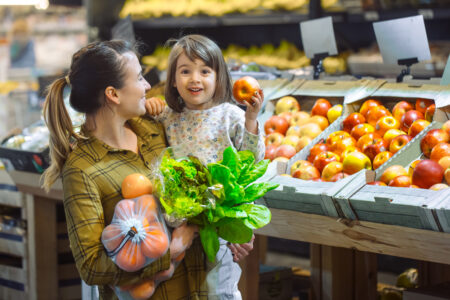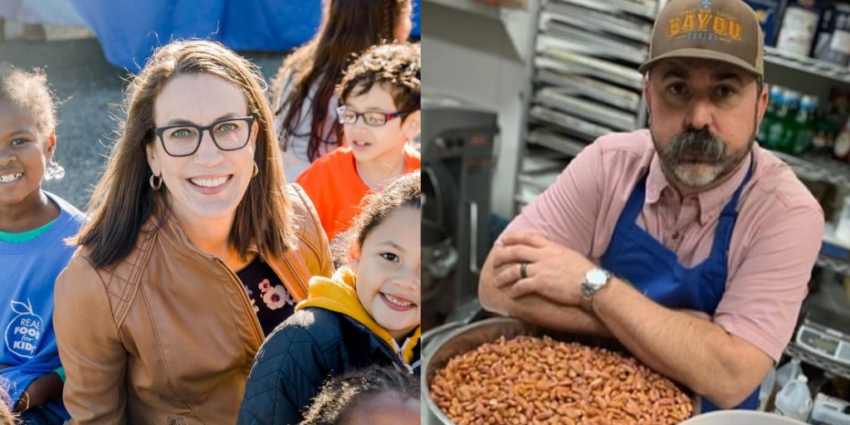
Share On Social!
Jenn Yates is an advocate who usually pushes for healthier school food in Arlington, Virginia (15.8% Latino).
David Guas is a chef who usually is feeding people.
These days, amid the COVID-19 pandemic, Yates and Guas are a dynamic duo that provides free meals to vulnerable families to prevent hunger while schools and restaurants are closed.
And, thanks to the advocate and the chef, red beans and rice are feeding thousands.
May 5 UPDATE: The Chefs Feeding Families initiative has provided 18,000 meals to families across the DC metro area.
Yates, the Advocate, Understands the Importance of Food Assistance Programs
Yates grew up in a low-income, working family. She said she is grateful for food assistance programs like free meals at schools.
“I got school meals as a kid,” she said. “My family was part of many government programs, like welfare, which is what they called it back then.”
Now, Yates is the executive director of a nonprofit advocacy group, Real Food for Kids, in Arlington.
Her group focuses on the regulatory, budgetary, and institutional challenges around improving healthy food in schools.
Then, COVID-19 hit.
“Suddenly the whole country was paying attention to the same thing: COVID-19 and how to respond,” Yates said.
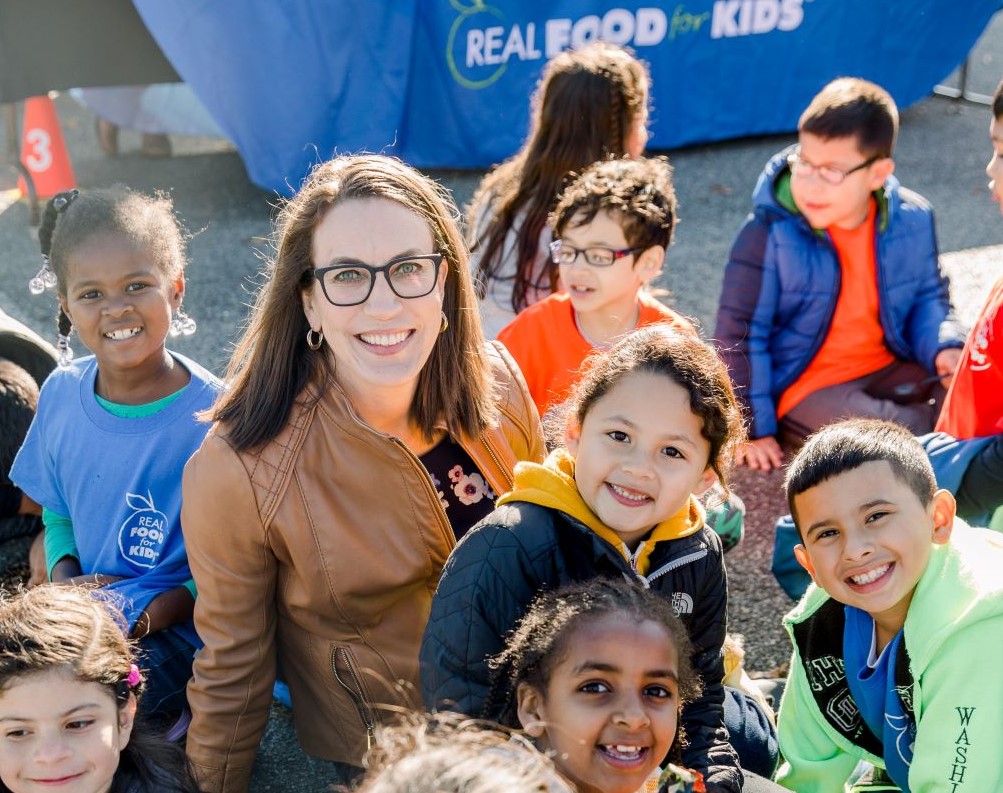
When local authorities discussed closing schools to slow the spread of COVID-19, Yates tried to imagine how her family would have adapted when she was a child.
“I keep thinking about if it suddenly became more difficult for my mother to access food,” Yates said. “How would my mom have wrangled us three kids to get a meal from the school every single day.”
Yates wanted to help feed families with healthy meals, even though her experience was in institutional change, not so much direct services.
“Our community is facing a monumental challenge to maintain families’ food access and stave off widespread hunger,” Yates said.
Guas, the Chef, Understands the Importance of Cuisine
Guas, a native of New Orleans, has been cooking southern-style food for over 20 years.
As the son of a Cuban father and American mother, food is very important to Guas’ culture. Even his newest cookbook will focus on Cuba, his family, and cuisine.
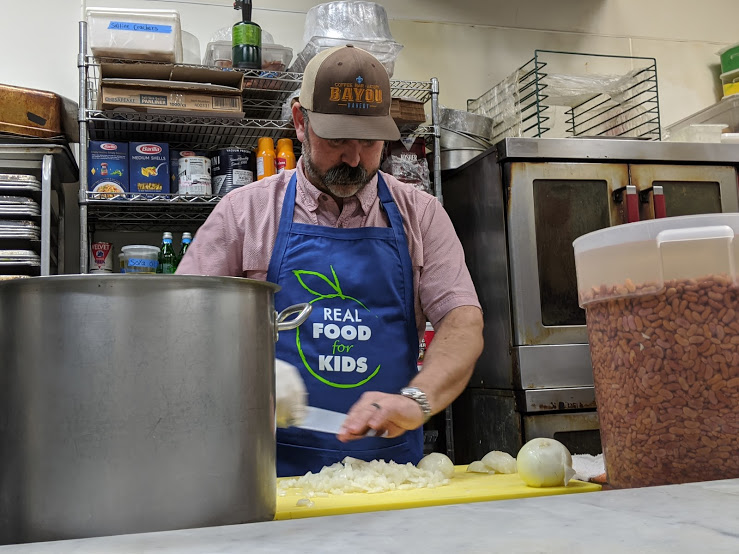 Guas also owns Bayou Bakery, Coffee Bar & Eatery in Arlington. The bakery is celebrating its 10-year anniversary in November 2020.
Guas also owns Bayou Bakery, Coffee Bar & Eatery in Arlington. The bakery is celebrating its 10-year anniversary in November 2020.
When the first rumblings of school closures were being discussed, Guas worried about how his employees’ kids would get meals during the day.
He wasn’t sure how big the coronavirus outbreak would get.
Guas had experience helping in a crisis in the past—after Hurricane Katrina, he sold po boys at the opening of a new restaurant and raised $40,000 in one day to help feed families.
“We probably fried 300 pounds of shrimp,” he said.
Fourteen years later, Guas got ready to cook again to help in a crisis.
Coronavirus Threatens Food Access in Arlington Schools
Guas and Yates had worked together for the past 10 years on educational campaigns and fundraisers for healthy food in Arlington communities and schools. They host an annual Food Day at School to build a giant salad in a kid’s pool to teach about vegetables.
Arlington Public Schools (APS) serve almost 30,000 students (28% Latino).
Guas expressed shock when he learned that 8,300 kids were enrolled in the free/reduced meal program in Arlington.
“That’s a big number for me,” Guas said.
As COVID-19 hit, both Guas and Yates worried how school closures would impact children who depend on school meals.
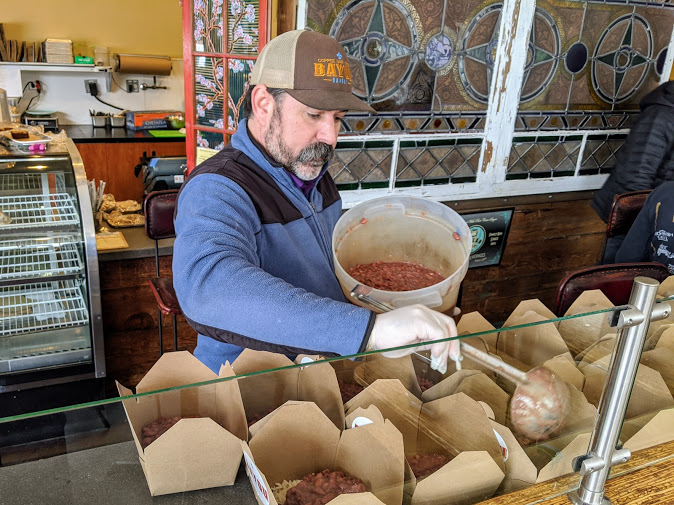
Even though many schools quickly developed a grab-and-go meal program for families in response to school closures, some families will still fall between the cracks.
“We already know that during the summer meal program, we don’t have 100% participation,” Yates said. “No matter how much schools expand their grab-and-go meals, we know there will still be families in need.”
“Whiles APS is doing everything they can, they were only able to provide meals at two locations initially,” Guas added.
APS concentrated the distribution of school meals in parts of the county where the most students participate in the lunch program. However, there are pockets of need everywhere, according to Yates.
“This crisis is particularly unique and difficult,” Yates said. “And it’s going to fall on the backs of the most vulnerable.”
Coronavirus Threatens Food Access in Arlington Community, Too
Guas and Yates know that with coronavirus-related travel bans and business closures, many people in her community have already lost or are going to lose their job. Thus further compounds food access issues.
Bayou Bakery went from 23 employees to eight as non-essential businesses closed in Virginia.
“How do we even start to accommodate that sudden and huge need for people who just lost their income?” Yates asked. “The challenges for families related to coronavirus are just starting, and they are only going to grow.”
Lack of reliable transportation options could become particularly problematic as families’ budgets become tighter and vehicle expenses become unbearable.
“Everyone is afraid of getting sick, so they don’t want to take bus or metro,” Yates said.
For example, one Guatemalan family in Yates’ neighborhood must walk an hour each way to pick up their school meals.
“Families that are eligible for the free school lunch program clearly need financial help,” Guas said. “How can we expect them to own and maintain a car and drive to where free meals are?”
“I worry about how many times that plays out in households in communities all over the country,” Yates said.
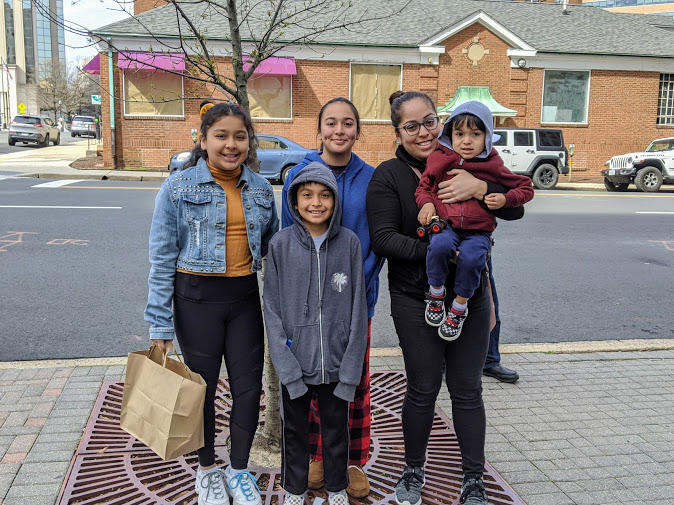
Moreover, despite long lines and empty shelves at grocery stores, on March 24, 2020, the Governor of Virginia issued an order that classified farmers markets as dining establishments, thus limiting markets to delivery and/or takeout services.
“If a grocery store can control the flow of people, so can farmers markets,” Yates said. “Hopefully the order will be overturned.”
But that’s how Yates thinks—at the institutional level.
COVID-19 brought a crisis at the ground level.
Guas, Yates Partner in Serving Meals to Families amid COVID-19
Guas and Yates connected by phone on March 14, 2020, to brainstorm how they could help these families.
“We just started popping off ideas,” Guas said.
Yates decided that Real Food for Kids would take a temporary break from advocacy and focus on direct services, like providing meals to families in need.
“It feels like we would be out of touch with what’s happening right now if we continued to advocate for institutional change without the addressing immediate needs in our community,” Yates said.
Guas decided to utilize his talents.
“The one thing I know how to do right now is cook,” he said.
Yates understood the value of partnering with a chef in an existing restaurant.
“His restaurant is permitted,” Yates said. “They already have staff trained in food safety.”
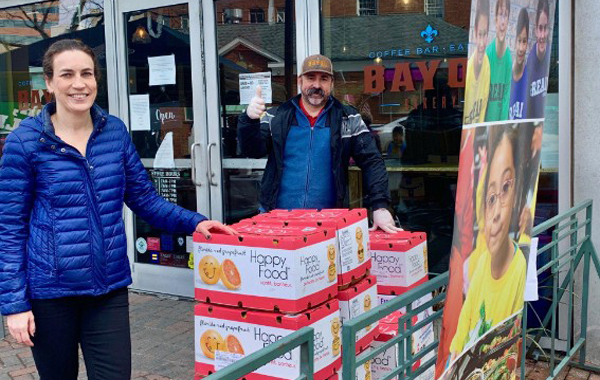
They decided that Gaus would prepare and distribute the meals. Real Food for Kids would raise funds to reimburse him.
The called it Chefs Feeding Families.
The pair wanted to serve plant-based meals and remain conscientious of a broad range of dietary and religious restrictions.
They decided on red beans and rice.
Regardless of age, resident status, school enrollment, number of children, or income, Guas and Yates made a commitment to serve red beans and rice to people in need until schools open back up.
Guas Serving Meals to Families in Need
On Tuesday, March 17, 2020, just three days after the pair’s first conversation, Bayou Bakery served red beans and rice─as well as some fruits and vegetables─to 100 people from 11 a.m. and 1 p.m.
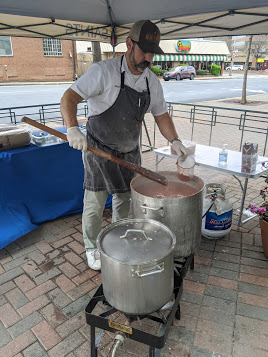
Guas prepared the food and staff distributed it.
Real Food for Kids spread the word on Facebook, Twitter, Instagram and through other channels.
“This effort is intended to complement Arlington Public School’s emergency meal distribution,” Real Food for Kids Tweeted on March 14.
Reaching Latinos was important to Guas and Yates.
“The hardest thing is to get to the communities in need and have people understand and trust what we are offering,” Yates said.
However, Yates doesn’t speak Spanish and Guas was struggling to keep his business going while also cooking meals for the community.
Luckily Yates’ good friend speaks Spanish. When developing flyers and social media posts about free meals, Yates would use Google Translate to translate into Spanish first and then send it to her friend to edit.
In the first week, they served 800 meals.
Good Moring America even did a story about Guas.
Local farms have donated lettuce, bell peppers, berries, and other fruit.
“The main reason for getting this started was literally to take care of my team and their kids,” Guas said. “They are part of this effected issue with the schools closing.”
Although APS was now serving meals from five locations, Guas knew APS was promoting meals for children from age 2 to 18. He knew hundreds of junior and senior students are older than 18.
“When talking with the County, I found out there is a significant number of kids that are 19, 20, and 21 years old that are still in high school,” Guas said. “Seeing that, supported our initial idea not to ask questions when handing out meals.”
Next Steps for the Advocate and the Chef
As of March 28, 2020, they served 1,523 grab-and-go meals.
When Guas and Yates started, they thought schools would be closed for about two weeks. They didn’t know that schools would end up being shut down for the rest of the school year.
Now, they are working to expand their menu options, again focused on plant-based meals compatible with a broad range of dietary and religious restrictions.
Yates continues to raise funds and local farmers and organizations continue to donate produce.
“When recipients walk up, in addition to giving them a hot meal, we can now also ask if they want some raw ingredients, like bell peppers and lettuce, to prepare something at home,” Guas said.
They both continue spreading the word and connecting with other organizations and groups that could benefit.
For example, they are talking with public housing advocates to bring food to them rather than require people travel to their location.
“We are also brainstorming about reaching out to food trucks who may not be operating because no one is working downtown,” Yates said.
They are also working to develop a replicable model with recipes and diagram of distribution so that other restaurants can do something similar.
“Real Food for Kids maintains focus on healthy food, and we are going to try to stick to that during this crisis,” Yates said. “Serving meals we can feel good about.”
“If someone walks up to us and asks for three meals, we aren’t asking them anything,” Guas said. “We made food for the day and we’re going to give it out.”
April 1 UPDATE: Silver Diner at Rio in Gaithersburg, Md., and the Pizzeria Paradiso mobile pizza oven joined the Chefs Feeding Families initiative.
By The Numbers
142
Percent
Expected rise in Latino cancer cases in coming years
This success story was produced by Salud America! with support from the Robert Wood Johnson Foundation.
The stories are intended for educational and informative purposes. References to specific policymakers, individuals, schools, policies, or companies have been included solely to advance these purposes and do not constitute an endorsement, sponsorship, or recommendation. Stories are based on and told by real community members and are the opinions and views of the individuals whose stories are told. Organization and activities described were not supported by Salud America! or the Robert Wood Johnson Foundation and do not necessarily represent the views of Salud America! or the Robert Wood Johnson Foundation.


